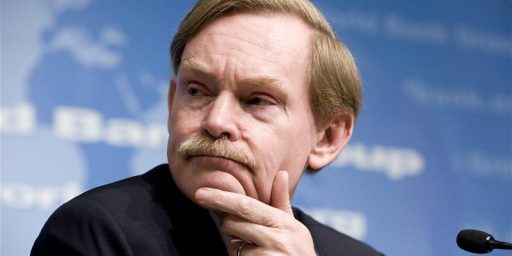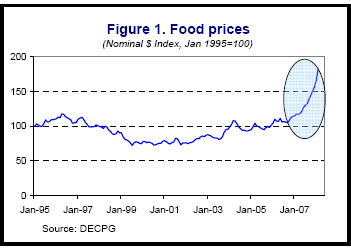PROTECTIONISM
UPI’s Ian Campbell notes that, despite the growing acceptance of free markets in the developing world, the WTO is failing because of politics in the West.
Following the failure of the Congress on Sunday afternoon U.S. Trade Representative Robert Zoellick blamed countries that were more interested in “tactical rhetoric” than negotiations. Pascal Lamy, EU Trade Commissioner said that the WTO was “a medieval organization” and was “not a rules-based body.”
Yes, the WTO is cumbersome and may need reform. But the conference failed long before the make or break negotiations of Saturday night and Sunday. The seeds of failure were sown in the past year and a half with the passage of the U.S. farm bill and the failure by the European Union meaningfully to tackle the farm subsidies enshrined in the Common Agricultural Policy.
The trade round launched in Doha, Qatar in 2001 was supposed to address above all weaknesses in agricultural trade. It would thereby foster development and poverty alleviation. There was, then, symbolism Sunday, the final day of the conference, in the breakdown of the talks on the so-called Singapore issues that were intended further to open developing country markets. On the final day of the five day summit agriculture had not yet been discussed.
Priorities told. The Singapore issues of investment, competition, transparency in government procurement and trade facilitation were simply not of interest to developing countries. Why were they being discussed at all? Agriculture was the supposed priority of the round and the undoubted priority of the developing countries. For the United States, too, the Singapore issues were not the priority.
<...>
But what both Lamy and Zoellick are choosing to ignore is that it is Europe and the United States who are lagging behind ideologically. For they promote free trade on their grossly biased terms.
European and American farmers receive huge subsidies and are thereby protected against imports from developing countries. The EU, in particular, dumps products on international markets, doing enormous damage to poor countries. Textiles, supposedly opened up nine years ago in the Uruguay round, still receive extensive quota protection. The very products developing countries produce are those to which Europe, the United States and Japan remain largely closed. The world’s poor are the victims and in Cancun the poor countries’ representatives got angry.
Lamy and Zoellick did what they could. The WTO’s bitter failure in Cancun goes back to political failures in Washington, Brussels, Paris and Berlin. Lamy referred, amusingly, to the relatively small numbers of victims of trade negotiations who have considerable trouble causing capacity. No doubt he had in mind farmers and piles of manure. It’s time that in the interests of the world’s poor and all of us the rich world’s leaders acquired the courage to take the complainers on.
It’s not likely to happen any time soon, unfortunately. Ironically, continued opposition to free agricultural trade is one area where the U.S. and France are staunch allies.





One thing that really annoys me about the WTO coverage is that people protesting on behalf of LDC farmers were called “opponents of free trade” by the media, when in fact, insomuch as they want an end to protectionism and tariff barriers in the West, they’re proponents of free trade.
—